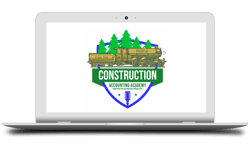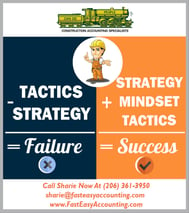Tips For Getting Your Construction Business Through Tough Times
Posted by Sharie DeHart on Fri, Mar 13, 2020
Topics: Construction Accounting, Contractor Challenges, Contractor, Contractor Tips, Contractor Operating Tips
Annual Tax Return Pointers For Construction Contractors
Posted by Sharie DeHart on Fri, Mar 06, 2020
Topics: Networking, Construction Accounting, Contractor, Contractor Tips, Contractor Operating Tips, small business connections
Contractor Networking - How To Connect With Local Business Owners
Posted by Sharie DeHart on Fri, Feb 28, 2020
Topics: Networking, Construction Accounting, Contractor, Contractor Tips, Contractor Operating Tips, small business connections
Bookkeeper, Accountant, And CPA For Contractors - Understanding Roles
Posted by Sharie DeHart on Fri, Feb 21, 2020
Topics: Accountant, Construction Accounting, Contractor, Contractor Tips, Contractor Operating Tips, Construction Systems And Processes
Topics: Business Planning For contractors, Contractor, Contractor Tips, Contractor Operating Tips, Construction Systems And Processes
Six Effective Ways To Save Money As A Construction Business Owner
Posted by Sharie DeHart on Fri, Feb 07, 2020
Topics: Accountant, Construction Accounting, Contractor, Contractor Tips, Contractor Operating Tips, Construction Systems And Processes
A Construction Contractor's Optimal Guide To Profiling Clients
Posted by Sharie DeHart on Fri, Jan 31, 2020
Every business caters to a specific demographic, and while some audiences might be vast, it is still essential from a marketing perspective that you know your clients and how to reach out to them. You'll need to understand your product or service, seek out feedback, learn about your customers' habits and interests, and maintain a consistent and targeted marketing campaign.
Knowing Your Brand
There's no shortage of novice construction companies out there who are attracted by the empty promises of making a quick profit by providing a service that is in high demand during a particular season, even if they aren't at all familiar with the execution. The reality of a successful construction business is quite a different thing; however, you need to be thoroughly familiar with what you are trying to work on (whether you are installing, repairing, or renovating), and you need to believe in it.
Whether you're a lone contractor or you're planning to start a small construction business with multiple employees or partners, you'll need to define your mission and come to understand your products and services fully. You cannot hope to accurately profile your clients if you do not have the utmost familiarity with what you are trying to sell to them. You'll need to pay attention to every detail before putting yourself in the shoes of your customers. When you know your brand, and it has a clearly defined mission, you'll be ready to start profiling your customers and tweaking your approach to marketing as necessary.
Seek Feedback
Seeking feedback is a critical ongoing process, but you should also start by doing plenty of research before you can even hope to get your marketing strategy off the ground. Your construction business will inevitably need to adapt over time to the needs and desires of its clients, not least because the customer has far more control these days than ever before by way of things like social media and online reviews.
Seek out feedback from your clients at every opportunity, but make sure that you don't end up being intrusive and don't bombard people with too much information or too many questions. Many customers won't have the time or the patience to leave feedback, and you'll have to learn to accept that. Fortunately, there are some practical ways of encouraging your customers to leave feedback, such as by offering incentives like promotional codes and other discounts for completing a short survey or answering a few questions about their preferences and habits.
Feedback doesn't always need to come from clients themselves, either. You can gain invaluable insights, albeit not entirely as accurate, by reviewing reports on your industry. Many companies provide insights into specific markets by analyzing trends in online behavior to help your business better define its target audience.
Create Your Client Personas
Create a profile of your perfect customer. If your construction business has an unusually broad reach, then you'll want to segment your target audience and create personas for each customer category. Map out the behaviors and interests of your customers based on important factors such as demographics, buying habits, geographical location, and more. You can even name these imaginary customers if you like, since this may help you to imagine them in a more practical light.
When defining your customer profiles, be sure to seek answers to the following questions:
- What other related businesses would they likely choose to work with?
- What sort of subject matter is most likely to interest them?
- What are their demographical attributes?
- Where are they located?
- What do they need or want?
- What do your customers do to entertain themselves?
- What is their income level?
- How much would they be willing to spend?
- What are their priorities and goals in life?
- How do they approach change?
- What are their past purchases?
- How often have they hired you?
Every day, millions of people turn to Google to find answers to their questions, solutions to their problems, or simply something to entertain them. What sort of queries does your business offer solutions for? By knowing your customers' problems, curiosities, and interests, you'll be able to tailor your content, your marketing strategy, and your product itself to better suit those criteria.
Avoid basing your customer personas on a real customer, since no single individual can completely represent your target audience. Instead, a customer persona should be reasonably broad, and it should characterize your perfect customer.
Profiling your customers won't result in your construction company's profit if you don't know how to sell more to existing clients. Just because you're a contractor who provides services doesn't mean you can't cross-sell or up-sell. It's much easier to sell to existing customers than to acquire new ones. Read on to learn how to generate more income by working these two sales strategies like a pro.
Cross-selling
Cross-selling is simply inviting your customers to buy a secondary item that naturally bundles with a product they're already purchasing. This works particularly to the handyman and home service and repair contractors who have materials readily available for use. You'll get the best results with cross-selling when a complementary item is offered at a much lower price point.
Up-selling
When you up-sell to a customer, you're asking them to consider a higher-priced upgrade during a sales transaction. Think of an up-sell as a recommendation. You're endorsing the best version of a product or service your customer is already planning to buy. It's usually much easier to up-sell a customer than to cross-sell.
Paying more for the premier option is a smaller stretch for a client than deciding to buy something extra that wasn't initially part of the plan. Whenever you're telling your clients about a product's features, suggest the benefits of the premier option. Even if they decide not to buy at the highest price point now, they might keep it in mind for next time.
Up-selling often happens naturally in sales when the focus is on the product that would best meet your client's needs rather than starting with price. Explain the differences between two or three options, providing all the information your clients need to make the best choice.
In conclusion
With your client profiles in place, you'll be able to match each area of your marketing strategy to the individual characteristics of your clients. By targeting smaller and more specific audiences, you should be able to increase the percentage of paying customers and valuable leads instead of wasting time and money on targeting the wrong people.
As you integrate up-selling and cross-selling into your sales strategy, always keep your ideal clients and their needs top of mind. By being knowledgeable about the problems your customers most want to solve and able to provide honest, helpful advice - your clients will grow to trust you and your recommendations.
Ultimately, don't forget that it's not about getting more visitors to your website: it's about getting more visitors that go on to become paying clients.
P.S.
We are excited and honored that Randal is nominated for the 2020 Small Business Person Of The Year award in our city. If you are on Alignable, I would appreciate it if you can connect with us and "like" our recommendation.
Screenshot of Alignable nomination
About The Author:
Sharie DeHart, QPA is the co-founder of Business Consulting And Accounting in Lynnwood, Washington. She is the leading expert in managing outsourced construction bookkeeping and accounting services companies and cash management accounting for small construction companies across the USA. She encourages Contractors and Construction Company Owners to stay current on their tax obligations and offers insights on how to manage the remaining cash flow to operate and grow their construction company sales and profits so they can put more money in the bank. Call 1-800-361-1770 or sharie@fasteasyaccounting.com
OUTSOURCED ACCOUNTING FOR
THE BUSY CONTRACTOR
IN A MOBILE ENVIRONMENT

|

|

|

|
Download the Contractors APP today from the App Store or Android Store
Access Code: FEAHEROS
Click here to download the App on Android:
Click here to download the App on iOS:
Simply scan the QR code or search for ‘MyAccountants’ in the App Store and enter the Access code: FEAHEROS to utilize the powerful App features and capabilities, and benefit from having our Construction Accounting App at your fingertips, 24/7."
PS: Even if you are not a Construction Contractor you will find a plenty of benefits in the app so we invite you to download it too! It's Free so why not?
Topics: Hiring Employees, Contractor, Contractor Tips, Contractor Operating Tips, Construction Systems And Processes
Collaboration - Why It's Essential To Your Construction Company
Posted by Sharie DeHart on Fri, Jan 24, 2020
As collaboration occurs, teams leverage individual differences to produce exceptional outcomes. This knowledge sharing creates a learning enterprise in which construction employees more readily identify solutions to problems. As a consequence, the company may become more operationally and financially successful.
There are many reasons that collaboration has these positive effects.
- Makes The Best Use Of Available Skills
A collaborative environment makes a range of disciplines accessible on an as-needed basis, which leads to the efficient use of employee talent in a way that isn't possible otherwise. Collaboration allows multiple individuals to participate in the completion of a task at hand, which makes it more likely that the right talent is available at the right time. With collaboration, tasks are completed more efficiently, leaving more time for staff to concentrate on activities that contribute to your construction company growth.
- Facilitates Problem Solving
Collaboration allows a company to throw the most skilled resources at a problem, which may mean a solution is identified more quickly and more cost-effectively than might be possible otherwise. Leveraging the most appropriate resources means a team's overall functional breadth and depth increase, which can improve the quality of a project's processes and result.
Besides, diverse and complementary talent may enhance individual work processes as each employee becomes a part of a greater whole, which can positively affect a construction company's culture. It's the change in culture that contributes to new thinking, which may lead to new ways to perform, which helps the company to grow.
- Leverages Individual Differences
Asking employees with very different skills to collaborate to accomplish an objective leverages individual knowledge, strengths and capabilities and maximizes organizational potential. A team succeeds or fails according to the combined capabilities and commitment of the individuals involved.
Deploying a variety of unique strengths and skills advances a team's understanding of a problem, which can lead to faster problem scoping and solution formulation, and more effective solutions.
- Builds Company Knowledge
A group brings different perspectives to a problem at hand. As individuals share their views, each team member considers issues from multiple viewpoints, and the person begins to think like the group.
Likewise, as each individual demonstrates a particular skill, other team members may learn these skills, which will be helpful when attempting to accomplish new goals. In effect, team interaction allows team knowledge to build up, like compound interest. In this way, a construction company leverages individual perspectives across the enterprise.
- Creates a Learning Enterprise
Collaboration provides an opportunity to move beyond learning management systems and content to learning in context, which can be empowering to an entire team.
When two people work together, they inevitably share knowledge, which contributes to a culture that supports ongoing learning. Consequently, collaboration creates a safety net that protects a company from a lack of appropriate expertise.
As an individual collaborates with others, his knowledge expands as does the reach of his skills. When this occurs throughout the organization, its knowledge boundaries extend, leading to new opportunities and new ways of doing things.
One way to improve and encourage collaboration in your workplace is by developing your communication skills, whether you are a construction business owner, project manager, or staff. Here are a few ways to improve it:
1. Always maintain control of your emotions in stressful situations
Leaders are often called upon to make difficult decisions under circumstances that are not ideal. If you can keep a cool head and calmly make decisions in a crisis, the people around you will begin to recognize you as the go-to leader when new or challenging situations arise.
2. Remain focused on the conversation at hand
When you are in the middle of working on a project, it is easy to get tunnel vision that prevents you from focusing on what is happening around you. When someone engages you in conversation, always make an effort to stay focused on what they are saying. Occasionally repeat back your understanding of what the other person just told you. Not only will this behavior make them feel you value their input enough to listen, but it will also increase the level of respect they have for you as a leader/coworker.
3. Pay attention to your body language
It is important to remember that your body language can be just as essential as what you say. If you are in the middle of a conversation with someone and they see you furrowing your brows or not making eye contact, they could walk away with the impression that you are disinterested or angry with them. Try to maintain a neutral expression when conversing with your staff or coworkers.
4. Do not interrupt
When you are a leader, people will often approach you because you have the answers. However, it can be easy to speak without a full understanding of what is being asked and provide someone with incorrect information. Always allow the other person to finish their thought and ask their question in its entirety so you can give a thoughtful, helpful answer.
5. Do not make snap judgments when speaking to someone
Occasionally, leaders are sought out when someone has made a mistake or poor business decision. If someone you are leading comes to you and admits they have done something wrong, try your best to withhold judgment. Sometimes this will require you to listen to their side of the story and reschedule a meeting later in the day or week to discuss a more productive course of action. Other times, it may be as simple as asking them what their solution to the issue would be and addressing it from that angle.
6. Be consistent with your feedback
When you are leading people, ensure that you look for opportunities to offer positive and negative feedback consistently. Many issues in building sites can be prevented by merely mentioning positive behavior when you see it and constructively pointing out negative behaviors as they occur in hopes of it ending there.
Final thoughts
If you are looking for ways to lead and collaborate more effectively, communicating better is one of the easiest and most valuable skills you can learn. Effective communication will help you to gain the trust and respect of individuals around you, which is one of the most valuable assets you can acquire.
Collaboration supports a company's efforts to act with a shared sense of urgency by deploying employees with particular skills in a variety of ways. Collaboration is also an effective means of problem-solving because it allows a construction business to leverage individual employee differences, evaluate employee efforts in the aggregate, and create a learning enterprise. When problems are solved more readily, resources become available to achieve other construction company objectives, including business growth.
P.S.
We are excited and honored that Randal is nominated as the 2020 Small Business Person Of The Year in our city. If you are on Alignable, I would appreciate it if you can connect with us and "like" our recommendation.
Screenshot of Alignable nomination
About The Author:
Sharie DeHart, QPA is the co-founder of Business Consulting And Accounting in Lynnwood, Washington. She is the leading expert in managing outsourced construction bookkeeping and accounting services companies and cash management accounting for small construction companies across the USA. She encourages Contractors and Construction Company Owners to stay current on their tax obligations and offers insights on how to manage the remaining cash flow to operate and grow their construction company sales and profits so they can put more money in the bank. Call 1-800-361-1770 or sharie@fasteasyaccounting.com
OUTSOURCED ACCOUNTING FOR
THE BUSY CONTRACTOR
IN A MOBILE ENVIRONMENT

|

|

|

|
Download the Contractors APP today from the App Store or Android Store
Access Code: FEAHEROS
Click here to download the App on Android:
Click here to download the App on iOS:
Simply scan the QR code or search for ‘MyAccountants’ in the App Store and enter the Access code: FEAHEROS to utilize the powerful App features and capabilities, and benefit from having our Construction Accounting App at your fingertips, 24/7."
PS: Even if you are not a Construction Contractor you will find a plenty of benefits in the app so we invite you to download it too! It's Free so why not?
Topics: Contractor, Contractor Tips, Contractor Operating Tips, Construction Systems And Processes
Get your current employees on it
Turn to Social Media
Reach out to past candidates
About The Author:
Sharie DeHart, QPA is the co-founder of Business Consulting And Accounting in Lynnwood, Washington. She is the leading expert in managing outsourced construction bookkeeping and accounting services companies and cash management accounting for small construction companies across the USA. She encourages Contractors and Construction Company Owners to stay current on their tax obligations and offers insights on how to manage the remaining cash flow to operate and grow their construction company sales and profits so they can put more money in the bank. Call 1-800-361-1770 or sharie@fasteasyaccounting.com
OUTSOURCED ACCOUNTING FOR
THE BUSY CONTRACTOR
IN A MOBILE ENVIRONMENT

|

|

|

|
Download the Contractors APP today from the App Store or Android Store
Access Code: FEAHEROS
Click here to download the App on Android:
Click here to download the App on iOS:
Simply scan the QR code or search for ‘MyAccountants’ in the App Store and enter the Access code: FEAHEROS to utilize the powerful App features and capabilities, and benefit from having our Construction Accounting App at your fingertips, 24/7."
PS: Even if you are not a Construction Contractor you will find a plenty of benefits in the app so we invite you to download it too! It's Free so why not?
Topics: Hiring Employees, Contractor, Contractor Tips, Contractor Operating Tips, Construction Systems And Processes
Home Maintenance And Repair Service Company Automation And Technology
Posted by Sharie DeHart on Fri, Jan 10, 2020
Topics: Contractor, Contractor Tips, Contractor Operating Tips, Construction Systems And Processes






































